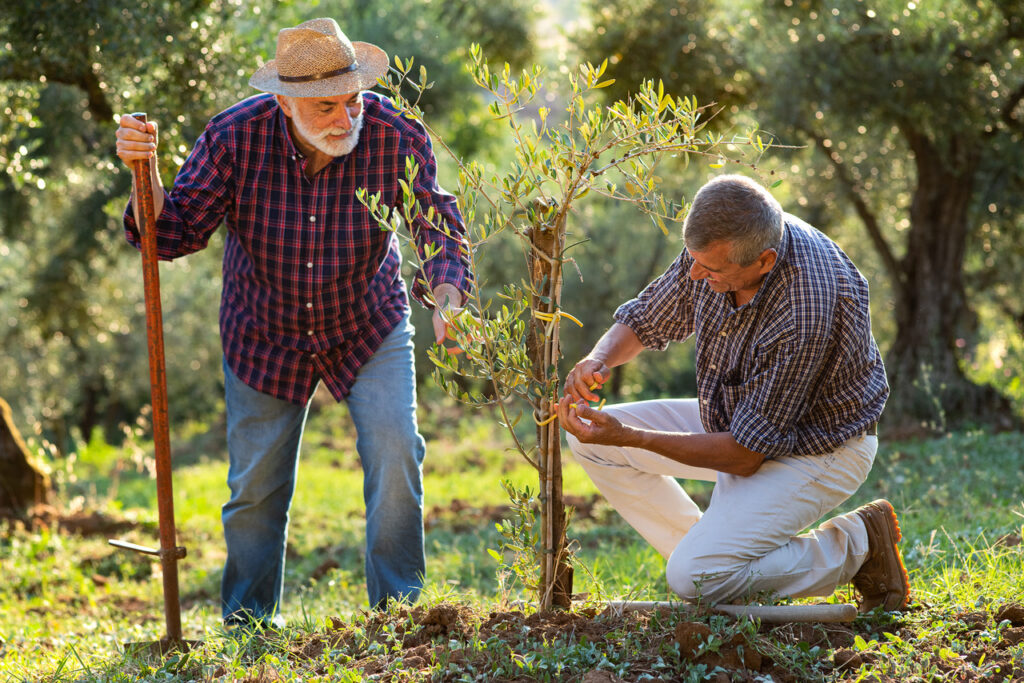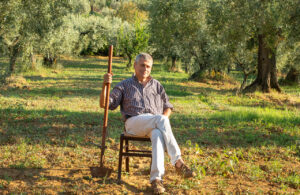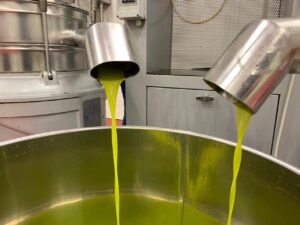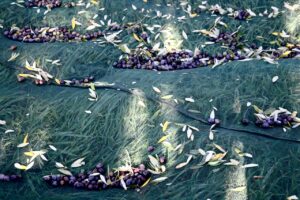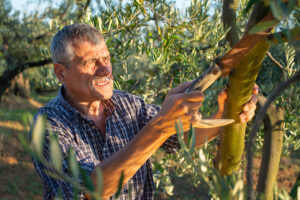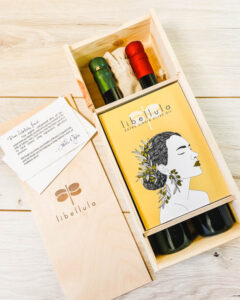This is part of our Regeneration series in which we commit to covering stories, people, and companies that have taken it upon themselves to turn climate challenges into opportunities, proving that giving back to the planet and the communities around you and business do not have to be mutually exclusive.
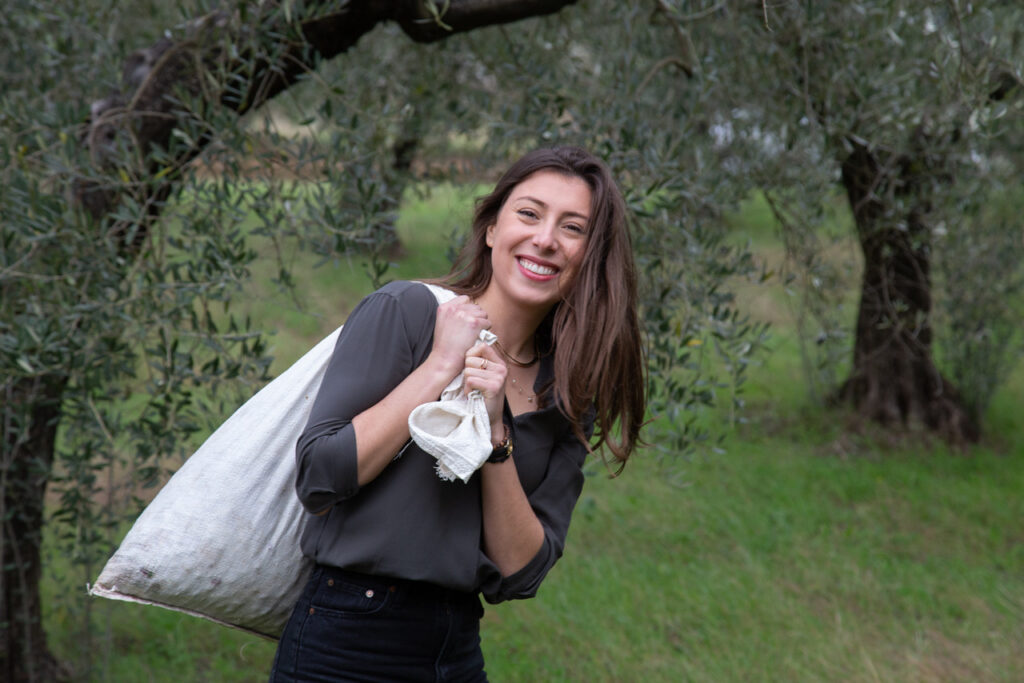
Olive trees have an almost romantic quality, from front gardens in London to the beautiful Tuscan landscape and in fact most of the Mediterranean they leave an indelible impression. In the region of Sabina in Italy olive trees are inherited over generations. But the cost and know-how of maintaining them has led to many groves being abandoned. Julia Franchi Scarselli and her father, both avid olive oil lovers, saw an opportunity by banding these small groves together and creating a new business model.
Can you describe Libellula? What sets it apart?
Libellula was born out of the challenging reality that family farmers in Italy face: the unpredictability of weather makes year-long investments in the land no longer financially viable. Where Libellula is situated in Montelibretti, Lazio, the shiny new Amazon distribution center, tucked away in the hills nearby, is becoming a more secure option for farmers and younger generations. Libellula, through its customers, strives to keep the cultural identity of the region alive and preserve the knowledge that transcends over generations.
Libellula provides olive oil lovers and environmentally conscious consumers with a direct link to nature and farmers. Through olive grove adoptions, Libellula enables customers to invest in a family grove of their choice for a return of extra virgin olive oil.
Through the adoption, customers also support Libellula’s three sustainability goals: the planting of new trees, the transition to regenerative agriculture, and the restoration of abandoned olive groves. Seasonal newsletters provide updates on the cultivation cycle, offering a window into the life of a farmer and an opportunity to learn about regenerative agriculture. There is always an open invitation to visit the groves and participate first-hand.
Libellula uses regenerative agricultural practices. Can you talk to us about how you came to favor such practices and how you implement them?
It would be good to first talk about sustainable practices. Sustainability refers to the ability to continue over a period of time and at no harm to people and environment. It is good to be sustainable, but sustainability doesn’t consider giving back to people and environment. Regeneration in turn refers to the process of renewal, growth and ecosystems that are resilient to disturbances. Therefore, when it comes to Libellula, we are looking to regenerate the soil to support stronger, healthier olive trees, plant new ones, increase and protect the biodiversity of the ecosystem, and support the resilience of the community and the people that interact with the ecosystem. It is a more holistic, systemic approach that looks at the whole living system comprised of many interconnected parts, that create ripple effects if supported to thrive.
You have mentioned the use of technology. What are the ones that farmers can take advantage of to optimise their yields and the maintenance of their crops?
Several tools have come out to help farmers confront the unpredictability that comes with climate change. We work with FieldView which, through GIS technology, allows us to monitor each section of the land. While some areas of the land are naturally more arid and thus need more hydration, the soil in other areas of the groves is better able to retain moisture. Using this technology helps us manage resources sustainably and effectively.
We also work with Elaisian to prevent any potential risks to our olive trees. This technology allows us to closely monitor temperature, weather patterns, ice, rain, and potential pests, so that we can quickly intervene if the health of our trees is in danger.
But whether we are utilising traditional farming methods or new innovations, we always stay true to organic and regenerative practices, learning new methods along the way.
Libellula works as a cooperative, can you explain what this banding of forces and olive trees does for the farmers in terms of opportunities?
Libellula works with a growing number of family-owned groves in a cooperative format. This means we share resources (people, tools, know-how, energy, etc.) across groves to decrease individual costs and labour for family farmers. Over time we see this slowly turning into a local community founded on mutual support, as one farmer’s success is everyone’s success. This is quite unusual in a place with long-standing inter-family conflict due to deep-rooted family histories.
The incentive to join Libellula’s cooperative for family farmers is the ability to retain the groves in the family and make an income from it, which was previously not possible due to the small size of their groves. Most families keep their olive groves because of emotional attachment and tradition and use the year’s EVOO to subsist on and gift to family and friends. Libellula contributes to the local economy as family farmers have the option of making additional income.
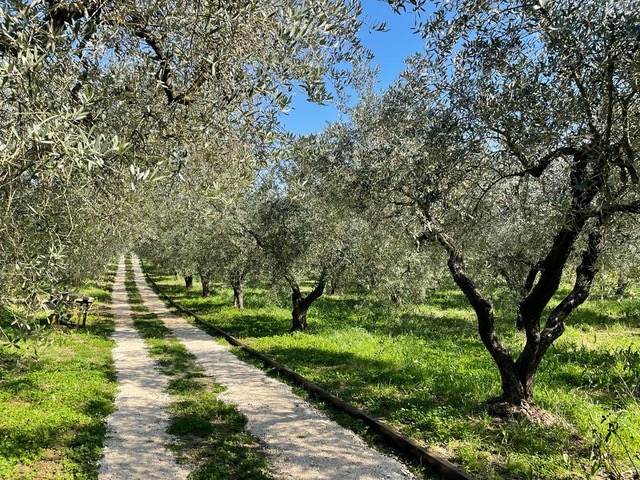
Personally, you also work for an organisation that works towards very practical goals in the climate space at the European level. Can you talk about what lessons you take from that experience and apply to your family business?
Being in touch with pan-European missions and objectives is incredibly helpful as it offers a birds-eye view of challenges faced by stakeholders across the continent, as well as insight into government priorities and support being offered. Interestingly there is also a healthy flow from the ground-up, as the experience working with farmers and being in touch with their realities informs my work on a European level. I am tactile person, so Libellula keeps me grounded in local realities and provides me with a compass to guide me toward meaningful contribution.
What important lessons do you think the wider agricultural community can take from your particular case study?
Working together and building ties across the community is the strongest form of resilience. In 2021, a freezing gust of wind from Siberia blew through the Sabina region unusually late in the Spring, burning the flowers that had already bloomed on the olive trees. The result was no olives. For a whole year, there was nothing anyone could do but hope that the next year would be better. Building a strong community is like building a strong foundation on a house: it can weather any storm. Luckily some groves weren’t hit as hard and did bear fruit, allowing for some olives to still be harvested – diversification and collaboration are key, especially in the face of climate change.
Another lesson is to appreciate that innovation can appear to be threatening to some farmers. Regenerative practices are still viewed as foreign by some, and many farmers will not budge from implementing practices handed down by their great, great grandparents. At times we sense distrust when meeting with new local farmers about joining our cooperative. Fear of change is only natural, and there needs to be an appreciation for tradition and a preserved sense of ownership, even in the cooperative. Innovation need not eradicate tradition or come in overnight. Rome wasn’t built in a day. We work with farmers to understand where they are at and focus on improving the resilience and quality of their groves rather than overriding their tradition with new practices. We work in symbiosis to find practices that work with the local context where they are ready to evolve with novel environmental conditions.
And do you plan on expanding the group of farmers that apply your practices and methodologies to more regions?
For the near term we are focusing on the Sabina region, between Rome and Tuscany. This is our home, and there is a lot of work to do here. In the future, we would love to work with family farmers in other regions across Italy. We already know a family farm close to Mazzara del Vallo, a town along the western shore of Sicily, as well as some abandoned groves in the Cilento region south of Naples.
Let’s go back and talk about the adoption scheme and why you implemented that.
Olive grove adoptions are the heart of Libellula. When my father and I co-founded Libellula, I was studying in the United States and bore witness to vapid consumption that didn’t offer much meaning other than the numbers on the nutrition facts label. We wanted to create a product that offered more than that, an opportunity for customers to contribute to something greater than themselves and interact with something beyond a bottle on the shelf. The adoption model strives to provide customers with meaning, a full sensory experience that transcends taste. We believe that being invested in the success of something makes an experience even more memorable, meaningful, and delicious… as well as a great dinner conversation topic!
My personal mission is to build mutualism between human society and ecological systems through creative and impactful partnership-building. Therefore, the adoption model is this mission in action: it is a form of partnership between customers and farmers, bridging people with nature.
How has climate change affected the cultivation of olive trees in general?
Climate change has impacted the cultivation of olive trees in many ways. In Puglia, you may have heard of the devastating slash and burning of long swaths of olive groves to prevent the Xyllela fastidiosa bacteria from spreading northward (fastidiosa means annoying in Italian and is in fact much more than annoying). The spread north is facilitated due to increasingly warm temperatures that the Xyllela finds inviting.
Another issue is the change in weather patterns. While the olive tree is a strong plant that can endure extreme temperatures, it relies on a ritualistic cultivation cycle that assumes Spring and Fall weather is mild. The issue is not cold winds blowing through the valley in Winter, and not necessarily increased heat in the summer, but cold wind in the Spring and extreme heat in the Fall. It is all about timing: for example, it can take four hours for a freezing gust of wind to burn off all flowers of an olive tree once bloomed, but an olive tree that has yet to produce its flower can still bear fruit that Spring when confronted with freezing winds. Increased temperatures have also moved harvest season to be later in the Winter than normal, making predicting the right time to harvest much harder for farmers.
Can you talk to us about the parasite problem and what your farmers are doing in response to that?
Luckily the Xyllela is not largely felt in Sabina and in northern regions of Italy, however there is a pesky fly that feeds off the olive and that can ruin a whole batch of extra virgin olive oil if not caught before the olives are pressed. Therefore, to defend against their attacks, we apply caolino (a very fine clay mineral) to our olive trees. This creates a light layer that looks like dust, naturally repelling the fly and other bugs and insects.
You have a solar well which helps you in water management.
In 2021 we decided to invest in creating a solar well to localise our supply of water and reduce our energy consumption to zero. Our solar well integrates with data analysis platform so that we can conserve the amount of water flowing to our groves, preventing water waste.
What kind of challenges do you foresee coming your way with the exacerbation of climate change and what plans are you devising to answer those challenges?
We are anticipating more farmers abandoning their olive groves, more parasites increasing the risk of infection and disease, and more unpredictable weather patterns damaging the olive trees or reducing production that year to zero. We are already working on planting new trees of a heartier Tuscan variety that is used to colder temperatures and experimenting with how they do. As many farmers are doing, we are learning to listen to nature, respect it, and evolve with it rather than looking at it as the problem or source of hardship.
Unfortunately, climate change is a reality we must face that we brought on ourselves, and we are simply working to adapt to it and build resilience in our community and in the land. One of our groves, which we call Podere Giardinetto, is in essence our laboratory, where we practice new methods and share learnings with our farmers. We believe local supply to water and water collection systems, improved resource management systems, natural methods to repel parasites, grafting to create cultivars that are adept to new weather conditions, and knowledge-sharing will all be essential. We are constantly learning new things.
